Mississippi Today
In this shrinking Mississippi Delta county, getting a college degree means leaving home behind

ISSAQUENA COUNTY — The kings and queens of the South Delta School District tossed candy and waved at their families as the mid-October parade wound through a small town several miles north of this rural county.
“There’s no place like homecoming,” read a sign on a colorful “Wizard of Oz” themed float with a picture of Emerald City on the back.
Homecoming in Issaquena County, the least populated county in Mississippi — and one of the smallest in the country — is so popular that locals call it “South Delta University.”
But there is no college here, not for miles and miles; in fact, there is no public school of any kind. Students from Issaquena County attend school in neighboring counties — and it’s a big reason why many of these kids will have no choice when they grow up but to move away.
There are virtually no jobs for college graduates in this rural county blanketed in farm fields of soybeans, cotton and corn. There are no factories and no hospitals in Issaquena County. There are no public schools – haven’t been for decades. The median household income is roughly $24,000, a little more than half of the statewide average.
A single statistic underscores all these factors. Here, out of the county’s 1,111 residents, just an estimated 42 people aged 25 and older have a bachelor’s degree — meaning Issaquena County’s population has one of the lowest rates of educational attainment in America.
That’s not because people from this county aren’t going to college. Many of their families want them to get a degree — and then leave.
There’s little appetite or means in Issaquena to change this reality, a product of generations of decisions that favored powerful, largely white land interests over education and jobs.
“All my grandkids, they’re going to college,” said Norah Fuller, a Black farm manager, as he watched the football game that Friday night. “I’m going to make sure they’re going to college. Do we want the kids to stay? No. What they gonna stay here for?”

Unless his grandchildren want to work on a farm, it’s hard to say. Outside of local government and a prison, the primary source of jobs are the farms that have existed since before the Civil War. But these days, the white families who own much of the land in a county that’s 63% Black are hiring less, and they have little incentive to make room for industries or jobs that could bring college-educated people back.
Fuller himself left the area, dropping out of school in the early 1960s. He didn’t come back until he felt mentally ready to do the same kind of labor enslaved people in this area did.
“I had to get away,” he said. “I stayed away until I could handle it.”
So the cycle continues in Issaquena: Year after year, more and more people move away, leaving behind fewer reasons for anyone else to stay, for any change to happen, and more reasons for young, educated people to go.
“Around here, that’s really the only way you’re gonna make money,” said Amber Warren, a 29-year-old mom who has an associate’s degree and has tried to get a job in Issaquena that will support her three kids. After years of applying, she finally landed one as a caseworker aid last year making $11-an-hour.
Now she’s searching for a better-paying job, up the hills and out of the Delta, away from all her family.
Issaquena County is flat, desolate and strikingly more rural than anywhere else in Mississippi. The famous “blues highway” largely skirts this southwestern corner of the Delta, where much of the traffic consists of pickups, tractors and trailers. Along the river looms a grassy levee that’s rivaled in height only by large silver grain bins and silos.
The county has been in a state of economic depression for decades. But that didn’t happen overnight.
The story of this fertile land starts in 1820, when it was ceded by the Choctaw, whose words for “deer river” form “Issaquena.” Wealthy settlers — cotton farmers from the east — swooped in and set up plantations. By the eve of the Civil War, a vast majority of the nearly 100 farm operators in Issaquena owned enslaved people, who made up 93% of the county’s population, the highest percentage in Mississippi.
Reconstruction did little to change this imbalance of power. Agriculture continued to dominate the local economy. The “wild lands” were cheap, and Mayersville, the county seat, became something of a boom town, replete with hotels and saloons as the area grew to more than 10,000 people.
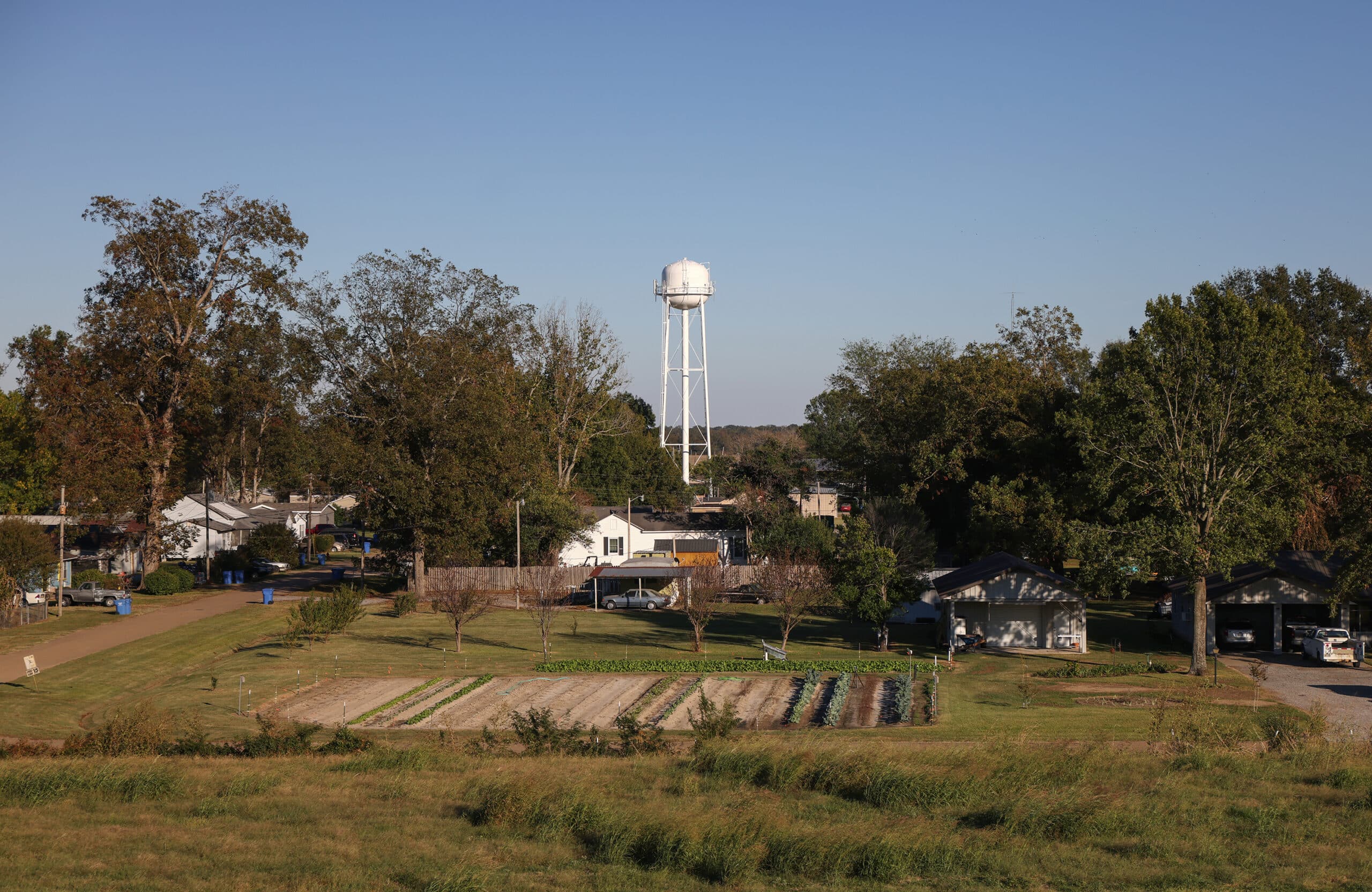
Soon politicians, businessmen and planters all over the Delta were vying for a railroad to come through their town, eager for alternatives to the crumbling, unpaved roads.
Issaquena’s landowners resisted, believing their land could get a higher price from the railroad companies. That wasn’t the case. The county was circumvented, and Issaquena, as one newspaper in 1902 put it, had “repented” ever since. A few logging rails run through the county today.
Thus began Issaquena’s first major population decline. Mayersville was soon considered the last undeveloped place in the Delta. By the 1930s, the county’s population had shrunk to less than 6,000. Nearly all of the farms were operated by sharecroppers.
Around this time, Stan Delaney’s grandfather crossed the river from Arkansas to Mayersville and, with money he’d saved from managing a farm, bought land. Delaney grew up on it. He learned to drive a tractor when he was 7, and he dropped out of the newly formed, private Sharkey-Issaquena Academy in his senior year to farm, working alongside a Black family, the Wallaces, that his dad employed.
The Wallaces have since moved away, Delaney said. Today, Delaney’s wife and son help him work the family’s roughly 1,150 acres, which are worth about $1 million. One of the county’s 189 farm producers who are white, Delaney rents the land from his mother.
His daughter, Whitney Delaney, went to college because she didn’t now want to farm. Now she figures she makes less working in a local community college’s student services than her brother does in farming.

Delaney wants to see more young people in Issaquena — especially so his 28-year-old son can meet someone. He knows industry could bring that. But he’d never dream of selling the land to make way for something different. If his kids didn’t feel the same, he’d set up a trust so it could never be sold.
“My dad worked so hard, and my grandfather worked so hard and sacrificed,” he said. “That’s your tradition, that’s just your Southern tradition.”
Like everything else here, the brick building four minutes from Mayersville on Highway 1 is surrounded by fields. Bales of cotton bound in bright yellow plastic greet visitors driving down the gravel road to the Head Start. The school, which opened in 1964, is Issaquena’s sole educational institution.
LaSonya Coleman logs attendance on her sherbert-green office’s desktop computer around 10 a.m. As the center manager, she oversees the development of 41 students. Just seven, she said, are from Issaquena.
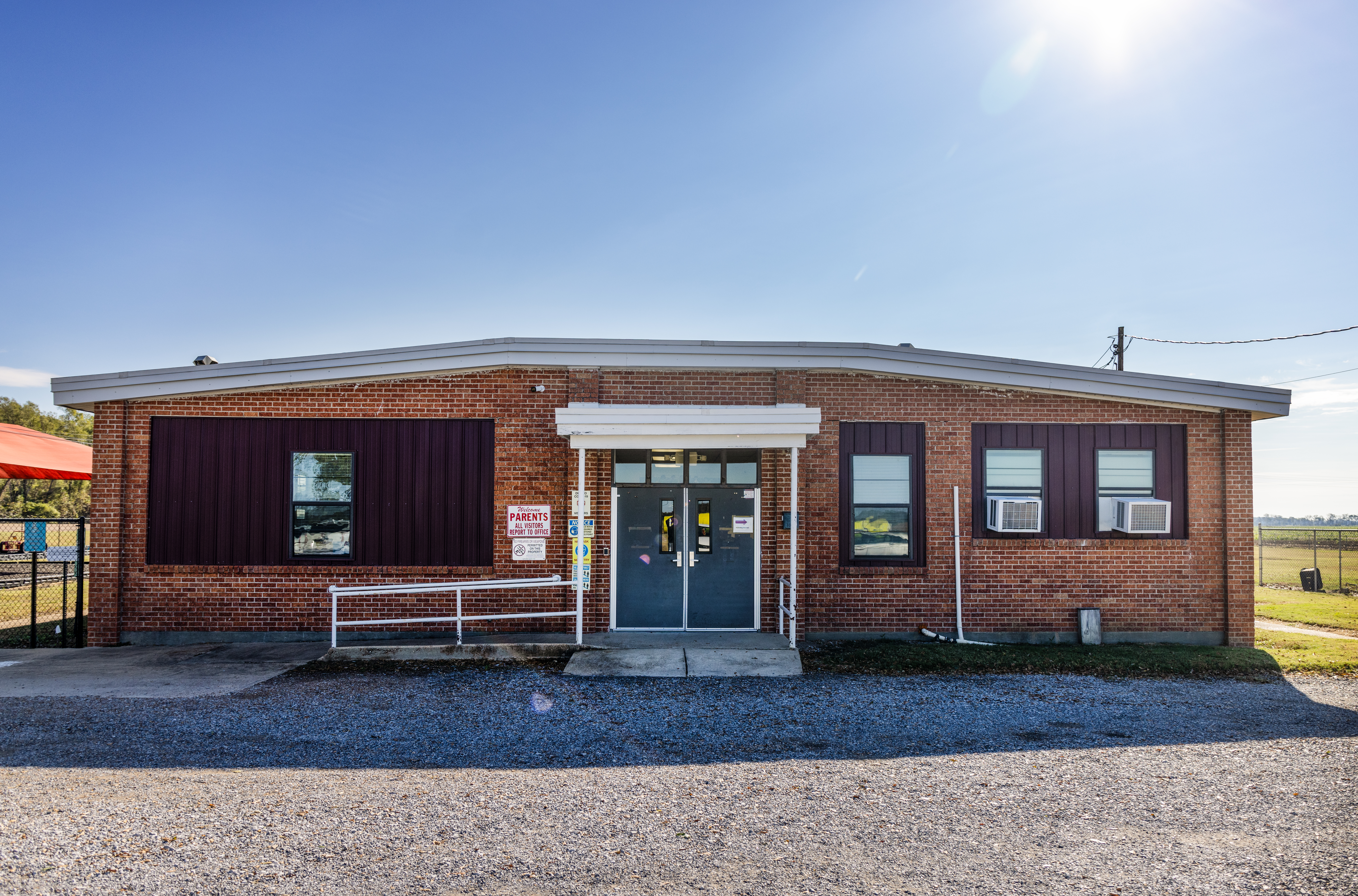
Today, many residents, Black and white, aren’t troubled by Issaquena’s lack of public schools because the population is so small. In rural school districts across the country, consolidation is a common cost-saving measure.
But the reason why there are no public schools in Issaquena has nothing to do with population.
In 1952, the U.S. Supreme Court took up five cases that signaled it was going to rule on school segregation. Fearing the end of separate-but-equal, white lawmakers in Mississippi scrambled. In a special session, they passed a plan to finally “equalize” the white and Black schools, believing the ruling could be stopped if the state proved it actually funded separate-but-equal facilities equally.
It was a futile attempt. Instead, the plan threw into relief how unequal school funding really was: Black students received just 13% of education funding around that time, despite making up 57% of the school-age population.
In Issaquena, which had no white schools, the plan resulted in the shuttering of the school district, making it the first county in the state to not have one of its own. There was little reporting on the local fallout, but according to a 1988 article, Isssaquena’s 13 public schools closed too.
Yet Issaquena County has continued to pay taxes to support public schools that, aside from educating its residents, provide scant economic benefit to the county itself. South Delta is based in Sharkey County; the Western Line School District is in Washington County. Mississippi Delta Community College is 60 miles away in Moorhead.
Last year, Issaquena paid more than $937,000 in taxes to support all three institutions, the bulk going to South Delta, according to the county auditor.
“Having a school district does require college-educated people earning not great salaries, but still college-educated salaries, which helps in terms of property taxes, income taxes, all of the above,” said Toren Ballard, an analyst at Mississippi First, an education policy nonprofit.

Coleman, the Head Start director, had grown up just south of Issaquena in a tenant house her father designed and built on a plantation farm. A “country kid,” Coleman and her 14 siblings would play in a nearby creek while her dad worked the land and her mom, a housekeeper, cared for the farm owners’ kids.
In 1991, Coleman, wanting to explore after she got her associate’s degree at Hinds Community College, moved to Chicago. She worked at her sister’s daycare center. Four years later, she came back to the area after her dad was diagnosed with prostate cancer. He could no longer work on the farm, so he had to move out of the house.
By 2016, Coleman returned for good to find the area’s population even smaller than when she’d left. She said she would always tell her sister that local politicians should be working to bring more to the county, like a museum, something that isn’t seasonal like farming or school.
“I mostly stay to myself, but I do a lot of observing of what goes on in the community,” she said. “And I feel that they should bring the jobs in.”
If anyone wanted to bring more jobs to Issaquena County, it’d be tough to do it without talking to George Mahalitc first.
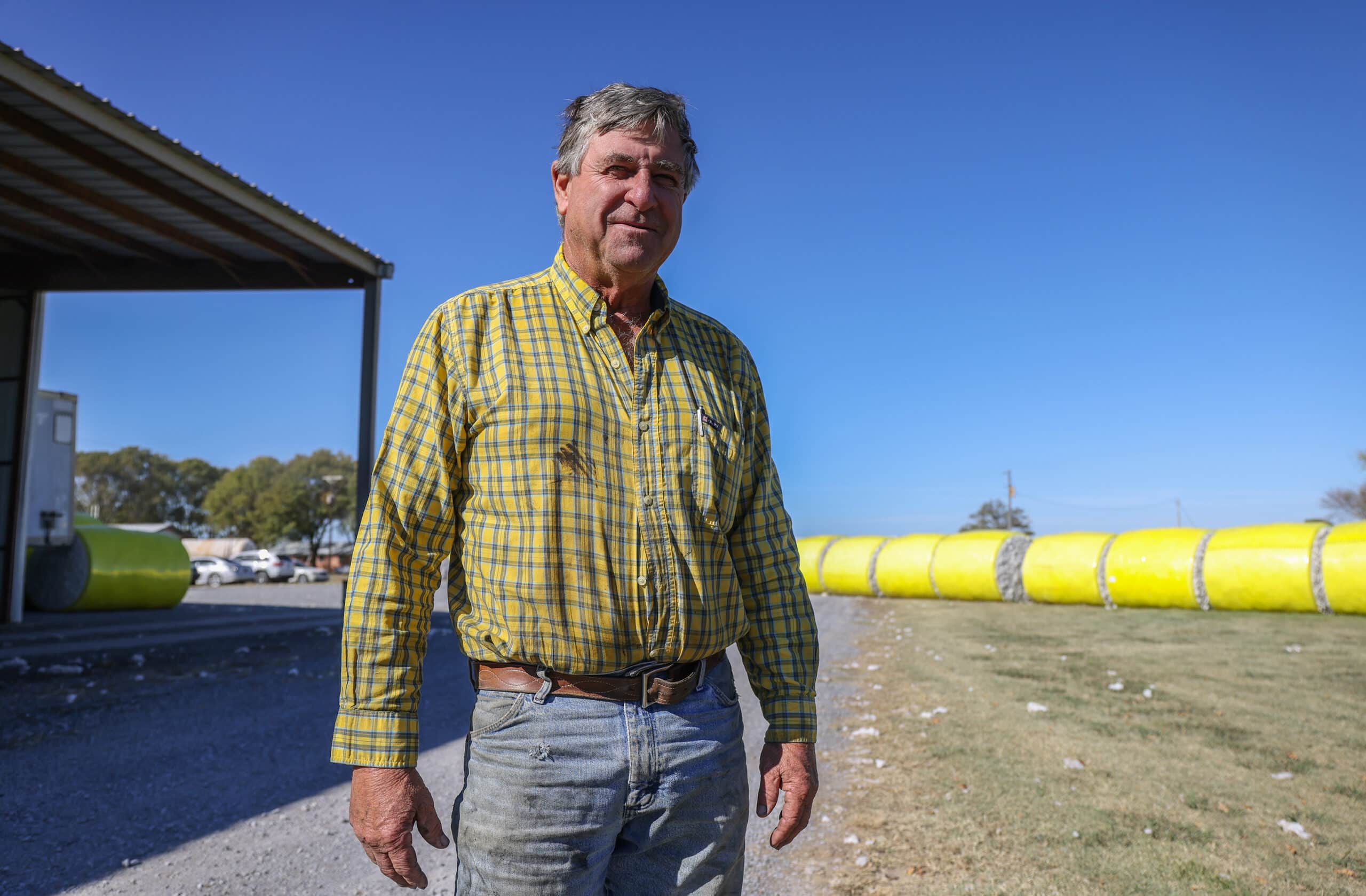
With more than 9,200 acres, Mahalitc is one of the largest private landowners in the county. His properties flank Mayersville to the north and south. In a classic tale of American success, his family moved to the area from Texas in 1961. Now, he may be the only farmer in Issaquena rich enough to grow cotton, an expensive crop. If a field is marked by bales of cotton wrapped in yellow, some locals say that probably means it’s Mahalitc’s land.
Mahalitc is also one of the county’s major employers. He hires tractor drivers and mechanics and workers for the cotton gin he owns with his brothers just over the county line in Washington County.
All told, Mahalitc employs about 30 people — something, he said, that’s getting harder to do.
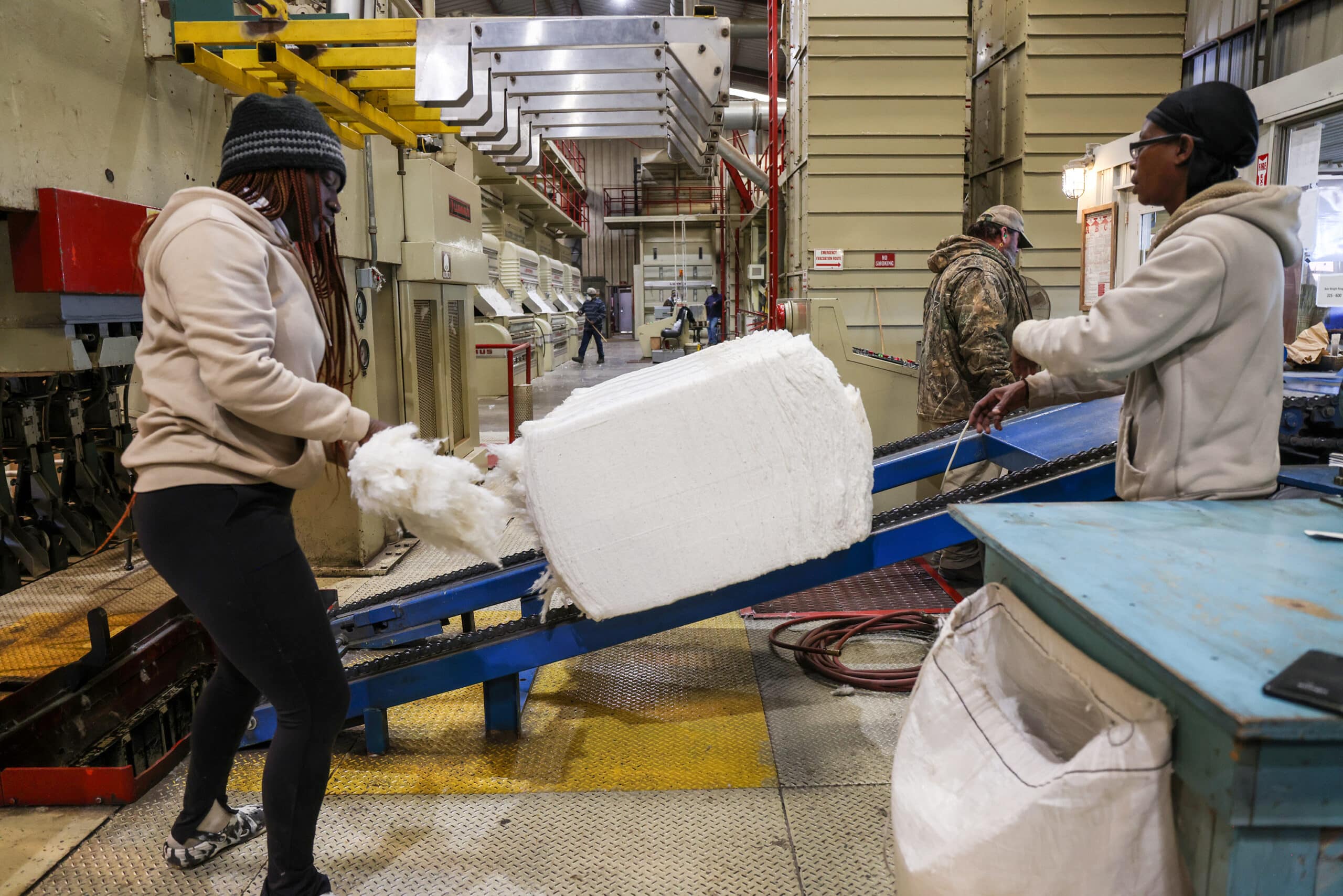
He believes that Issaquena has no jobs for college graduates, and few jobs for anyone else, because its people don’t want to work. His point of view is not uncommon among farmers and landowners.
“What needs to happen is people need to get off their lazy tails and wanna go to work,” Mahalitc said. “Our government is subsidizing paying these people to sit at home. That’s the problem.”
But it doesn’t take long for Mahalitc to admit that farmers, by and large, want Issaquena to stay this way.
“Us farmers, we like it like that,” he said. “We don’t want the big population.”
As farmers have historically provided most of the jobs in Issaquena, they’ve also resisted efforts to develop the land that could bring other industries to the county, even as mechanization means they’re hiring less. And because just 26 farm producers in Issaquena are Black, most of the people protesting development in Issaquena are white.
Some farmers want more development. For Mahalitc, it depends on the project; he was interested in selling his land to a solar panel company that recently approached him but, he said, the company backed out.
Waye Windham, another white farmer and the county’s sheriff, said a decade ago, he would hire seven to eight workers for his farm of soybeans and corn. Now he hires two.
“We can’t stop looking for industry to come here,” he said. “If we do, we won’t ever find anybody.”

Yet in 1990, farmers across the tri-county area foiled the county board of supervisors’ efforts to get a $75 million hazardous waste incinerator. It would have created 79 permanent jobs and increased local tax revenues by an estimated $2.5 million at a time when cities and towns across the southern United States were competing to process each other’s trash.
And it was a rare opportunity: Issaquena is prone to backwater flooding that can destroy roads, homes and farmland, another factor that has limited the county’s economic opportunities.
Fearing the damage the waste could cause to local crops, a pair of farmers fiercely opposed it, writing op-eds and sending mailers to every registered voter in the county, which ultimately voted 413-315 against the plant.
Mahalitc was one of the 413. The plant would have been across his property line, and he was worried about his crops. Plus, he didn’t think anyone in Issaquena would be qualified to work at the plant.
“Where would they have qualified people to help run something like that?” Mahalitc said. “They’re not here.”
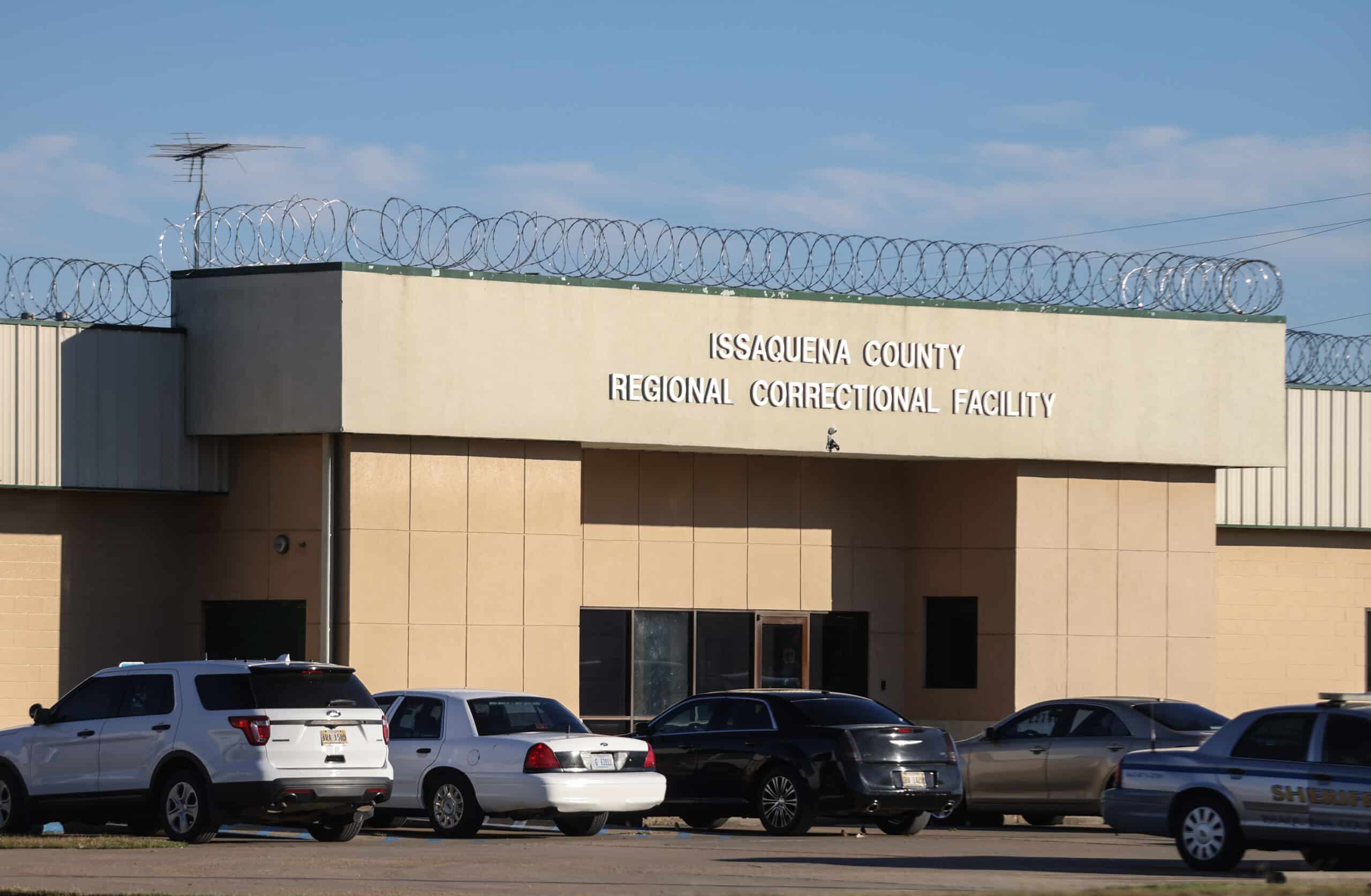
When the 376-bed Issaquena County Correctional Facility opened in 1997, it brought $1 million to the county tax rolls. Today it is the largest employer in the county — more than 50 people work there, but many are not from Issaquena — and it sits across Highway 1 from Mayersville. It, too, borders Mahalitc’s land.
Stallard Williams, a board supervisor who represents Mayersville, is skeptical the prison has kept its promise to Issaquena County. So is Willie Peterson, an alderman who has worked in local government for decades.
“We ain’t got no benefit from it, make sure you put that down,” Peterson said.
The prison recently has been at risk of shuttering. In 2019, the board of supervisors voted to do just that, believing the prison had lost more than $760,000 that year. But Williams thought there was more to the story. He’d been getting calls from people concerned the prison would be privatized, so he audited the numbers and determined the shortfall had simply been a mathematical error.
“I feel like, if something is not right, if it’s something that especially an interest group or anybody else have over the people, over the community, then I speak up,” Williams said.
With what money the county does have, Williams would much rather be spending his time on ambitious projects to finally develop Issaquena. In his nearly eight years as a supervisor, he has led the board to build a park and secured funding for a walking trail outside the county courthouse, right next to the street that could one day be Mayersville’s center of business activity.

But Williams wants to do more. He has a long list. To attract tourism, he wants to preserve the home of former Mayersville Mayor Unita Blackwell, the first Black woman to be elected mayor in the United States.
The Mississippi River, he says, is Mayersville’s “golden opportunity for economic development,” but the town doesn’t even have a port. He’d like to raise salaries at the prison, which pays just a few dollars above minimum wage. Issaquena, with its quiet swathes of land, attracts hundreds of recreational hunters and fishers — but there’s no place for them to buy gas locally.
The county’s future, Williams said, should be about “give and take” between landowners and workers.

“I benefit from the farmers,” said Williams, who started with his dad a local lawn business mowing farmers’ yards. “But as far as the people that just want a job here, they’re more likely gonna have to work on a farm or go 50 or 60 miles to get a job.”
Yet so many of his ideas require land to generate taxes and to build on. In recent years, some of the county’s land was bought by the state to create hunting grounds named after former governor Phil Bryant.
Change also requires political will. Some supervisors, like Eddie Hatcher, who runs a trucking company and privately owned hunting grounds, believe jobs are available in Issaquena if people want to work.

“When the government is giving able-bodies money for nothing,” he said, “why would you go to work?”
And sometimes even small improvements can be hard to do in an under-resourced place like Issaquena.
In late October, the Mayersville board of aldermen met at the town’s multipurpose complex. The mayor, Linda Williams Short, led the meeting. She has been mayor since she unseated Blackwell by 11 votes in 2001. Like most people in Issaquena, Williams Short doesn’t have a college degree.
Just two community members attended the meeting. The Yazoo City-bound Warren, whose mom is an alderman, and a man who Warren said always comes for “moral support.”
A heated discussion concerned some of the aging infrastructure in Mayersville, and the local construction company that was struggling to keep up. A few pipes were leaking across town. The water tower needed a new pump, and its gate, which had just been fixed, was falling down.
One alderman suggested getting “the whole system redone.” Williams Short insisted there was nothing she could do to speed up the work.
“We all know it’s been too long,” she said. “And all we can do is ask.”
This reporting is part of a collaboration with the Institute for Nonprofit News‘ Rural News Network, and the Cardinal News, KOSU, Mississippi Today, Shasta Scout and The Texas Tribune. Support from Ascendium made the project possible.
This article first appeared on Mississippi Today and is republished here under a Creative Commons license.
Did you miss our previous article…
https://www.biloxinewsevents.com/?p=310905
Mississippi Today
Mississippi Legislature approves DEI ban after heated debate
Mississippi lawmakers have reached an agreement to ban diversity, equity and inclusion programs and a list of “divisive concepts” from public schools across the state education system, following the lead of numerous other Republican-controlled states and President Donald Trump’s administration.
House and Senate lawmakers approved a compromise bill in votes on Tuesday and Wednesday. It will likely head to Republican Gov. Tate Reeves for his signature after it clears a procedural motion.
The agreement between the Republican-dominated chambers followed hours of heated debate in which Democrats, almost all of whom are Black, excoriated the legislation as a setback in the long struggle to make Mississippi a fairer place for minorities. They also said the bill could bog universities down with costly legal fights and erode academic freedom.
Democratic Rep. Bryant Clark, who seldom addresses the entire House chamber from the podium during debates, rose to speak out against the bill on Tuesday. He is the son of the late Robert Clark, the first Black Mississippian elected to the state Legislature since the 1800s and the first Black Mississippian to serve as speaker pro tempore and preside over the House chamber since Reconstruction.
“We are better than this, and all of you know that we don’t need this with Mississippi history,” Clark said. “We should be the ones that say, ‘listen, we may be from Mississippi, we may have a dark past, but you know what, we’re going to be the first to stand up this time and say there is nothing wrong with DEI.'”
Legislative Republicans argued that the measure — which will apply to all public schools from the K-12 level through universities — will elevate merit in education and remove a list of so-called “divisive concepts” from academic settings. More broadly, conservative critics of DEI say the programs divide people into categories of victims and oppressors and infuse left-wing ideology into campus life.
“We are a diverse state. Nowhere in here are we trying to wipe that out,” said Republican Sen. Tyler McCaughn, one of the bill’s authors. “We’re just trying to change the focus back to that of excellence.”
The House and Senate initially passed proposals that differed in who they would impact, what activities they would regulate and how they aim to reshape the inner workings of the state’s education system. Some House leaders wanted the bill to be “semi-vague” in its language and wanted to create a process for withholding state funds based on complaints that almost anyone could lodge. The Senate wanted to pair a DEI ban with a task force to study inefficiencies in the higher education system, a provision the upper chamber later agreed to scrap.
The concepts that will be rooted out from curricula include the idea that gender identity can be a “subjective sense of self, disconnected from biological reality.” The move reflects another effort to align with the Trump administration, which has declared via executive order that there are only two sexes.
The House and Senate disagreed on how to enforce the measure but ultimately settled on an agreement that would empower students, parents of minor students, faculty members and contractors to sue schools for violating the law.
People could only sue after they go through an internal campus review process and a 25-day period when schools could fix the alleged violation. Republican Rep. Joey Hood, one of the House negotiators, said that was a compromise between the chambers. The House wanted to make it possible for almost anyone to file lawsuits over the DEI ban, while Senate negotiators initially bristled at the idea of fast-tracking internal campus disputes to the legal system.
The House ultimately held firm in its position to create a private cause of action, or the right to sue, but it agreed to give schools the ability to conduct an investigative process and potentially resolve the alleged violation before letting people sue in chancery courts.
“You have to go through the administrative process,” said Republican Sen. Nicole Boyd, one of the bill’s lead authors. “Because the whole idea is that, if there is a violation, the school needs to cure the violation. That’s what the purpose is. It’s not to create litigation, it’s to cure violations.”
If people disagree with the findings from that process, they could also ask the attorney general’s office to sue on their behalf.
Under the new law, Mississippi could withhold state funds from schools that don’t comply. Schools would be required to compile reports on all complaints filed in response to the new law.
Trump promised in his 2024 campaign to eliminate DEI in the federal government. One of the first executive orders he signed did that. Some Mississippi lawmakers introduced bills in the 2024 session to restrict DEI, but the proposals never made it out of committee. With the national headwinds at their backs and several other laws in Republican-led states to use as models, Mississippi lawmakers made plans to introduce anti-DEI legislation.
The policy debate also unfolded amid the early stages of a potential Republican primary matchup in the 2027 governor’s race between State Auditor Shad White and Lt. Gov. Delbert Hosemann. White, who has been one of the state’s loudest advocates for banning DEI, had branded Hosemann in the months before the 2025 session “DEI Delbert,” claiming the Senate leader has stood in the way of DEI restrictions passing the Legislature.
During the first Senate floor debate over the chamber’s DEI legislation during this year’s legislative session, Hosemann seemed to be conscious of these political attacks. He walked over to staff members and asked how many people were watching the debate live on YouTube.
As the DEI debate cleared one of its final hurdles Wednesday afternoon, the House and Senate remained at loggerheads over the state budget amid Republican infighting. It appeared likely the Legislature would end its session Wednesday or Thursday without passing a $7 billion budget to fund state agencies, potentially threatening a government shutdown.
“It is my understanding that we don’t have a budget and will likely leave here without a budget. But this piece of legislation …which I don’t think remedies any of Mississippi’s issues, this has become one of the top priorities that we had to get done,” said Democratic Sen. Rod Hickman. “I just want to say, if we put that much work into everything else we did, Mississippi might be a much better place.”
This article first appeared on Mississippi Today and is republished here under a Creative Commons license.
Mississippi Today
House gives Senate 5 p.m. deadline to come to table, or legislative session ends with no state budget
The House on Wednesday attempted one final time to revive negotiations between it and the Senate over passing a state budget.
Otherwise, the two Republican-led chambers will likely end their session without funding government services for the next fiscal year and potentially jeopardize state agencies.
The House on Wednesday unanimously passed a measure to extend the legislative session and revive budget bills that had died on legislative deadlines last weekend.
House Speaker Jason White said he did not have any prior commitment that the Senate would agree to the proposal, but he wanted to extend one last offer to pass the budget. White, a Republican from West, said if he did not hear from the Senate by 5 p.m. on Wednesday, his chamber would end its regular session.
“The ball is in their court,” White said of the Senate. “Every indication has been that they would not agree to extend the deadlines for purposes of doing the budget. I don’t know why that is. We did it last year, and we’ve done it most years.”
But it did not appear likely Wednesday afternoon that the Senate would comply.
The Mississippi Legislature has not left Jackson without setting at least most of the state budget since 2009, when then Gov. Haley Barbour had to force them back to set one to avoid a government shutdown.
The House measure to extend the session is now before the Senate for consideration. To pass, it would require a two-thirds majority vote of senators. But that might prove impossible. Numerous senators on both sides of the aisle vowed to vote against extending the current session, and Lt. Gov. Delbert Hosemann who oversees the chamber said such an extension likely couldn’t pass.
Senate leadership seemed surprised at the news that the House passed the resolution to negotiate a budget, and several senators earlier on Wednesday made passing references to ending the session without passing a budget.
“We’ll look at it after it passes the full House,” Senate President Pro Tempore Dean Kirby said.
The House and Senate, each having a Republican supermajority, have fought over many issues since the legislative session began early January.
But the battle over a tax overhaul plan, including elimination of the state individual income tax, appeared to cause a major rift. Lawmakers did pass a tax overhaul, which the governor has signed into law, but Senate leaders cried foul over how it passed, with the House seizing on typos in the Senate’s proposal that accidentally resembled the House’s more aggressive elimination plan.
The Senate had urged caution in eliminating the income tax, and had economic growth triggers that would have likely phased in the elimination over many years. But the typos essentially negated the triggers, and the House and governor ran with it.
The two chambers have also recently fought over the budget. White said he communicated directly with Senate leaders that the House would stand firm on not passing a budget late in the session.
But Senate leaders said they had trouble getting the House to meet with them to haggle out the final budget.
On the normally scheduled “conference weekend” with a deadline to agree to a budget last Saturday, the House did not show, taking the weekend off. This angered Hosemann and the Senate. All the budget bills died, requiring a vote to extend the session, or the governor forcing them into a special session.
If the Legislature ends its regular session without adopting a budget, the only option to fund state agencies before their budgets expire on June 30 is for Gov. Tate Reeves to call lawmakers back into a special session later.
“There really isn’t any other option (than the governor calling a special session),” Lt. Gov. Delbert Hosemann previously said.
If Reeves calls a special session, he gets to set the Legislature’s agenda. A special session call gives an otherwise constitutionally weak Mississippi governor more power over the Legislature.
This article first appeared on Mississippi Today and is republished here under a Creative Commons license.
Mississippi Today
Amount of federal cuts to health agencies doubles
Cuts to public health and mental health funding in Mississippi have doubled – reaching approximately $238 million – since initial estimates last week, when cancellations to federal grants allocated for COVID-19 pandemic relief were first announced.
Slashed funding to the state’s health department will impact community health workers, planned improvements to the public health laboratory, the agency’s ability to provide COVID-19 vaccinations and preparedness efforts for emerging pathogens, like H5 bird flu.
The grant cancellations, which total $230 million, will not be catastrophic for the agency, State Health Officer Dr. Daniel Edney told members of the Mississippi House Democratic Caucus at the Capitol April 1.
But they will set back the agency, which is still working to recover after the COVID-19 pandemic decimated its workforce and exposed “serious deficiencies” in the agency’s data collection and management systems.
The cuts will have a more significant impact on the state’s economy and agency subgrantees, who carry out public health work on the ground with health department grants, he said.
“The agency is okay. But I’m very worried about all of our partners all over the state,” Edney told lawmakers.
The health department was forced to lay off 17 contract workers as a result of the grant cancellations, though Edney said he aims to rehire them under new contracts.
Other positions funded by health department grants are in jeopardy. Two community health workers at Back Bay Mission, a nonprofit that supports people living in poverty in Biloxi, were laid off as a result of the cuts, according to WLOX. It’s unclear how many more community health workers, who educate and help people access health care, have been impacted statewide.
The department was in the process of purchasing a comprehensive data management system before the cuts and has lost the ability to invest in the Mississippi Public Health Laboratory, he said. The laboratory performs environmental and clinical testing services that aid in the prevention and control of disease.
The agency has worked to reduce its dependence on federal funds, Edney said, which will help it weather the storm. Sixty-six percent of the department’s budget is federally funded.
The Centers for Disease Control and Prevention pulled back $11.4 billion in funding to state health departments nationwide last week. The funding was originally allocated by Congress for testing and vaccination against the coronavirus as part of COVID-19 relief legislation, and to address health disparities in high-risk and underserved populations. An additional $1 billion from the Substance Abuse and Mental Health Services Administration was also terminated.
“The COVID-19 pandemic is over, and HHS will no longer waste billions of taxpayer dollars responding to a non-existent pandemic that Americans moved on from years ago,” the Department of Health and Human Services Director of Communications Andrew Nixon said in a statement.
HHS did not respond to questions from Mississippi Today about the cuts in Mississippi.
Democratic attorneys general and governors in 23 states filed a lawsuit against the U.S. Department of Health and Human Services Tuesday, arguing that the sudden cancellation of the funding was unlawful and seeking injunctive relief to halt the cuts. Mississippi did not join the suit.
Mental health cuts
The Department of Mental Health received about $7.5 million in cuts to federal grants from the Substance Abuse and Mental Health Services Administration.

Over half of the cuts were to community mental health centers, and supported alcohol and drug treatment services for people who can not afford treatment, housing services for parenting and pregnant women and their children, and prevention services.
The cuts could result in reduced beds at community mental health centers, Phaedre Cole, the director of Life Help and President of Mississippi Association of Community Mental Health Centers, told lawmakers April 1.
Community mental health centers in Mississippi are already struggling to keep their doors open. Four centers in the state have closed since 2012, and a third have an imminent to high risk of closure, Cole told legislators at a hearing last December.
“We are facing a financial crisis that threatens our ability to maintain our mission,” she said Dec. 5.
Cuts to the department will also impact diversion coordinators, who are charged with reducing recidivism of people with serious mental illness to the state’s mental health hospital, a program for first-episode psychosis, youth mental health court funding, school-aged mental health programs and suicide response programs.
The Department of Mental Health hopes to reallocate existing funding from alcohol tax revenue and federal block grant funding to discontinued programs.
The agency posted a list of all the services that have received funding cuts. The State Department of Health plans to post such a list, said spokesperson Greg Flynn.
Health leaders have expressed fear that there could be more funding cuts coming.
“My concern is that this is the beginning and not the end,” said Edney.
This article first appeared on Mississippi Today and is republished here under a Creative Commons license.![]()
-

 Mississippi Today24 hours ago
Mississippi Today24 hours agoPharmacy benefit manager reform likely dead
-

 News from the South - Alabama News Feed6 days ago
News from the South - Alabama News Feed6 days agoSevere storms will impact Alabama this weekend. Damaging winds, hail, and a tornado threat are al…
-

 News from the South - Alabama News Feed5 days ago
News from the South - Alabama News Feed5 days agoUniversity of Alabama student detained by ICE moved to Louisiana
-

 News from the South - Oklahoma News Feed4 days ago
News from the South - Oklahoma News Feed4 days agoTornado watch, severe thunderstorm warnings issued for Oklahoma
-

 News from the South - Virginia News Feed5 days ago
News from the South - Virginia News Feed5 days agoYoungkin removes Ellis, appoints Cuccinelli to UVa board | Virginia
-

 News from the South - Florida News Feed7 days ago
News from the South - Florida News Feed7 days agoPeanut farmer wants Florida water agency to swap forest land
-

 News from the South - Kentucky News Feed6 days ago
News from the South - Kentucky News Feed6 days agoA little early morning putting at the PGA Tour Superstore
-

 News from the South - Georgia News Feed4 days ago
News from the South - Georgia News Feed4 days agoGeorgia road project forcing homeowners out | FOX 5 News











































